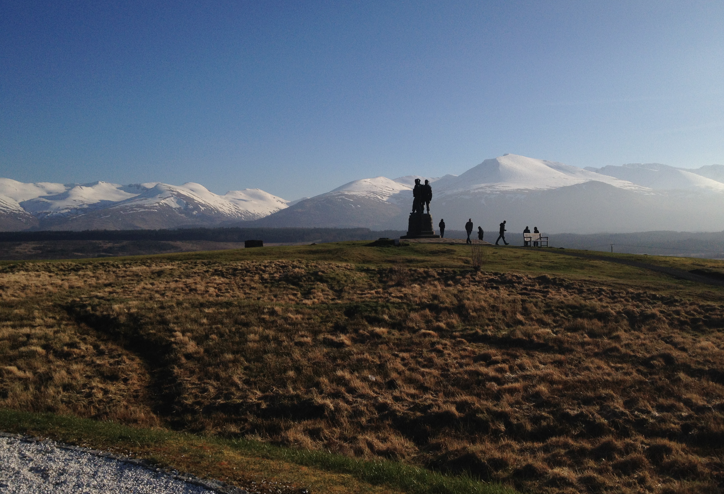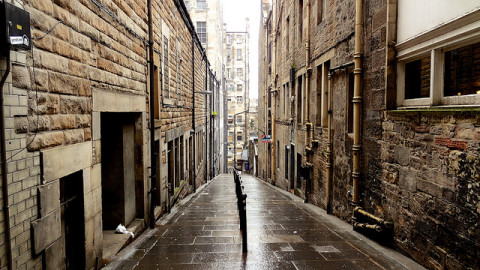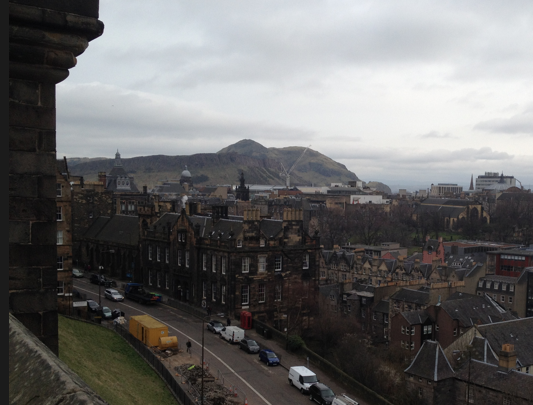Witnessing history while abroad in Scotland
October 3, 2014
During the five months I was abroad last semester on the southern coast of Great Britain, I visited many of the top tourist spots in Western Europe, and spent a few days each in Dublin, Amsterdam, Valencia, and Barcelona. But my favorite excursion- thanks to the people, the scenery, and the stories- was the week I spent in Scotland.
The people of Scotland are personable and ready at a moment’s notice to dispel many of the common misconceptions that foreigners have of their history and customs. For instance, the Mel Gibson classic, “Braveheart,” is factually and historically incorrect. We were told that there is no chance William Wallace wore a kilt or painted his face blue. We also learned the real purpose behind the Scottish kilts. Long ago, when warring nomadic tribes was the norm in Scotland, the kilts served as sleeping bags as well as legwear.
More importantly, we learned the true depth of the Scottish-English rivalry. The people of the two countries are seasoned to dislike each other, perhaps from being such close neighbors for centuries.
Consider the case of Sir Alex Ferguson, manager of one of the top soccer teams in the world, Manchester United, for 26 seasons. Twice, in 1999 and 2001, Ferguson was offered the head coaching position of the English National Team, which is considered one of the highest honors of the soccer world. Ferguson, being from the Glasgow district in Scotland, said in a recent interview that it never even crossed his mind to accept the job.
“It didn’t take me long to turn it down- 10 seconds. I thought about it for 10 seconds,” Ferguson said, “Never in a million years could I manage England. Think of me going back to Scotland. Dearie me.”
Our final day in Scotland, we took a day-long bus trip through the Highlands and our guide told us that due to plate tectonics, that Scotland is rising about a centimeter per year, and that England is “sinking” by about the same margin. He said that the Scottish would be fine with colder temperatures and a decrease in environment quality, if it only meant seeing the English “driven into the ground.” Only those who live in the UK can truly appreciate the depth of this rivalry.
But, on Friday, Sept. 19, the people of Scotland could have seen the sun rise over an independent Scotland for the first time in over 300 years. The day before on Thursday, Sept. 18, over four million voters, aged 16 and up, took to the polling stations deep to answer one simple question: Should Scotland become an independent country?
A “Yes” majority would have been historic. It would have set into motion the severance of ties from Scotland to the United Kingdom. It would have end a cooperation that had been in place since the Act of Union in 1707. It would have meant that Scotland would be a separate political and financial entity, no longer dependent on the decisions of British Parliament and the rest of the UK (Wales, Northern Ireland). If a majority of Scots had voted “Yes,” the country would have completely broken off from the UK on March 24, 2016. They even marked a future Independence Day!
But those in the “yes” camp will have to wait a generation or two for another chance to become independent. By a 55-to-45 percent majority, the Scottish people elected to stay within the bounds of the United Kingdom and the rest of the world seems to agree with this decision.
Many in the UK attribute the “no” victory to a rousing speech given the day before the election by former Prime Minister, Gordon Brown. In his speech, he passionately encouraged Scots to vote to stay with Great Britain in a “Better Together” campaign and referenced how the two had “fought and won two World Wars together.” Domestically, President Barack Obama was also pleased with the result and voiced his opinion- that the UK should remain as is- via Twitter.
Although a continued Union seems to be both the economically smart and globally-accepted result of the referendum, the almost two million Scottish who voted for independence will need to be appeased. In his speech, Brown outlined a number of promises British Parliament had made to the Scottish people assuring greater representation, better healthcare, etc. Britain will need to follow through if the kingdom is to remain truly united.
Why is this important?
This referendum has a worldwide scope, and the result has little to do with its reach. Scotland is not the only country or region that has had serious thoughts about breaking away from a larger entity in recent years. Catalonia, Quebec, Flanders and a few others have all had serious backing in the move to separate from their mother countries. These countries watched the buildup to the Scottish Referendum intently, and will take heed from it going forward in their efforts toward independence.
This event is historic, yet I may have only paid attention because I had just spent five months in this part of the world, and that’s the problem.
We have to pay attention. Today, it’s Scotland…tomorrow, the problem could be stateside, and by then it will be too late to start caring.

Joe Callagy can be reached at jcallagy@umass.edu.

